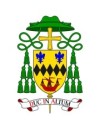Our Archdiocese
- Archbishop
- Bishop
- Vicar General & Episcopal Vicars
- Statistical Overview
- Boundaries of Archdiocese
- Organisational Structure
- Archdiocesan Assembly 2023-24
- Archdiocesan Plan 2016 - 2021
- History
- Coat of Arms
- Fifth Plenary Council of Australia
- Cathedral
- COVID-19 Position Statement
- Modern Slavery Statement
- Connect With Us
Homily - Ninth Sunday in Ordinary Time

Ninth Sunday in Ordinary Time
By the Most Rev Don Sproxton
Auxiliary Bishop of Perth
Holy Trinity Church, Embleton
Sunday, 29 May 2016
Download the full text in PDF
A few weeks ago, I went with some other bishops to Alice Springs. We were involved in a retreat for the members of the Aboriginal Catholic Ministry and it was a really beautiful experience.
One of the things that it was important for me to hear at this retreat was the witness of a lady from Stradbroke Island in Queensland. She was speaking with one of the bishops about the significance of symbols that we use in church, but also the symbols of things that are important to Aboriginal people right around Australia.
There are some common understandings and common significances that are given to these symbols across this land. Then there are symbols that are important in particular places. What impressed me was something she said. She said, even if we didn’t know who Jesus was, we understood the love that God has for us through the way that He provided for our people for 40 to 60,000 years.
That idea was that the Spirit provided for the peoples of this land over all those thousands and thousands of years, providing from the earth things that people needed to live on - the understanding they had of how things came to be – the water, the food, plants and animals. So she said, ‘in a sense, we did know Jesus’.
‘We didn’t know His name, or understand that He is the son of God, we didn’t understand or know what He had done for us, and what He had left for us.’ But, she said, ‘we had some sort of knowledge about Him because of theories people had about a great spirit’. She said, ‘we’re indebted to people who’ve come here in recent centuries and brought to us this knowledge of Jesus. Many things that the later arrivals on this land brought to this country have been very damaging for the Aboriginal people. We all recognise that and understand that’.
And this is why at this time of year we are remembering the ceremonies and celebrations of Reconciliation. There is a need for Reconciliation between the peoples of this land, because of that history. But she said the really positive thing and the most important thing that was brought to us was the understanding of who Jesus was and did, and what He left for us. What He left for us is what we are really celebrating today through the course of this Mass. He’s left us a Gospel, He’s left us an understanding of how to live our lives in a way that is positive, that builds us up as individuals. And He has left us, through the work of the Church, holy Sacraments.
And these are ways that Jesus continues to be present with us, right down to today. And He will continue to be with us through this community of the Church and the Sacraments here. So the people who are going to receive Baptism today are going to receive Jesus, who invites them to come and be part of His people.
That way, they will be able to enhance the lives of other Aboriginal brothers and sisters. They will receive from Jesus that understanding of being people of God, chosen people, people that He loves, and that really will have an impact on the other people with whom they live. And, those who receive Confirmation, will receive those gifts of the Spirit that Jesus promised.
